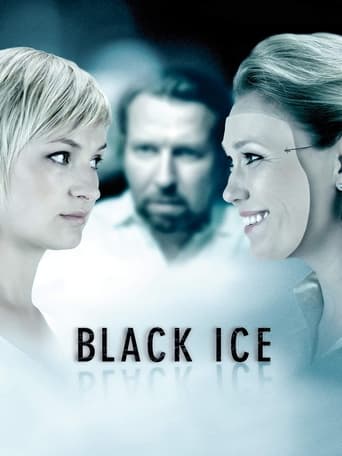MamaGravity
good back-story, and good acting
Tacticalin
An absolute waste of money
Beystiman
It's fun, it's light, [but] it has a hard time when its tries to get heavy.
Phillipa
Strong acting helps the film overcome an uncertain premise and create characters that hold our attention absolutely.
Fish_chips
Black ice is a strong film, with excellent characterisation, plot development, and filming; in fact it won seven Finnish Jussi (film industry) awards in 2008 including Best Film, Best Director, Best Script, Best Editing, Best Music, and Best Actress. The wife who is misled by her husband decides to play a complex game, but as the plot unfolds she develops dual feelings of both friendship and revenge towards her husband's mistress. Our feelings towards the mistress are bounced around too because she is quite happy to be a participant in the plot of deception she and the husband are engaged in, but then we find she herself becomes an unknowing target in the wife's plan of deception. The wife seems to have a fondness for knives (kitchen, gym props, and scalpels) and this gives the film a further degree of bite. Which of the 'friend or foe' feelings held by the wife will be triumphant by the end of this very fine film?
peterm9
In "Black Ice," Peter Kotwica ventures beyond his typical male lead to delve into the mind of a forty-year-old woman. Saara is not only beautiful, but also an accomplished surgeon. She is an idealization of the successful modern woman who has it all. Faced with her husband's affair, she acts like the surgeon she is, trying to fix the situation in a calculated and strategic manner. Her strong character and willingness to act sets her apart from what audiences often expect from a victim of infidelity. Kotwica's depiction of Saara benefits from the complexity of a personality that at the same time mixes dark feminine manipulation with the cold, intellect of a surgeon. So while Leo and his young student Tuuli initiate the action with their affair, it is Saara that takes control of the action. Saara's action jolts the audience, as such decisive action is something that would be more expected of a male than a female. At the same time, the way she uses her female characteristics makes her far more unsettling and deceitful than simple male anger. Kotwica has turned the typical love triange with two males competing for a female on its head. The development of Leo's character is less important because the movie is really about Saara and Tuuli. Both characters have strengths and areas that they control. The dangerousness of Saara is that she is able to use both her and Tuuli's strengths to her advantage. For instance, Saara allows herself to be Tuuli's judo student. There is certainly dark humor in that Tuuli is teaching Saara about power, strategic fighting and self-defense. These are all the mental attributes that Saara brings to the story. The point of the love triangle falls apart even before Leo's death as the drama becomes the line between the two women. Much of the films dramatic tension comes from the idea of black ice. Subconsciously furthered by the cold Finnish winter, there is an underlying feeling that Saara has put her foot on the accelerator and may not be able to control everything she has put into motion. Yet Saara proves to be a far more skilled driver than the others. Leo, in contrast, seems unable to steer his own life meaningfully. It turns out that when faced with events that require him to commit, such as becoming engaged or facing fatherhood, he responds through infidelity, betraying his superficial commitment. Likewise, Tuuli naively steps into Saara's car of friendship. Shot in cool blue tones, the viewer remains unsettled throughout the film. As the film progresses, Kotwica increasingly frames the shots with surgical precision. This leads the viewer to increasingly disconnect from the characters as Saraa's actions become more like a surgeon than a wife. Through desaturation, Kotwica reminds viewers that in the story it is always a figurative winter with dangers from both the cold and ice. Even Saara cannot control the cold and ice. It is the interaction of her actions with the cold and ice that leads to Leo's death. Yet, Saara continues to control the action to the end. As a surgeon, she saves Tuuli and her unborn child, ironic in that Tuuli wanted an abortion. So, Tuuli is figuratively still a passenger in Saara's car. Saara has turned from a modern woman full of life and accomplishment to the Snow Queen of Narnia and it is hard to tell that simply from the outside. That is why "Black Ice" makes your hair stand up just a little. Saara's character makes the viewer distrustful of what they see and this blurs the line between fiction and reality. Outi Maenpaa, Ria Kataja and Martti Suosalo reinforce this feeling without overacting. They allow awkward moments to be simply awkward and that make the performance feel real. Even in the end, Kotwica refuses to lead us to a proper end. It seems like it should be a fable with a purposeful end and yet the end just seems like reality. Ice isn't black and yet there is black ice.
drumgirlelena
Marital tension is not limited to any part of the world. Many couples experience problems that create stress and may lead to cheating. In his 2007 film "Black Ice," Petri Kotwica depicts a stereotypical cheating husband, however, he twists the story by adding a relationship between the hurting wife and oblivious mistress. The unique variation on this relatively familiar situation creates intrigue that transcends both language and culture, making "Black Ice" a captivating and edgy film for any audience, Finnish or not.A unique aspect of Black Ice is how quickly the plot gets going once the film has begun. After a short burst of romance between Saara and Leo, secrets start coming out and the tension begins. In some ways, leaving out the general introduction to Saara and Leo's relationship leaves something to be desired. It makes it difficult to relate to Leo at all because we are instantly introduced to his faults as a husband. However, this is very effective in that it puts us entirely on Saara's side, and introduces us to the discomfort of relational tension. Our lack of information somewhat reflects Saara's unfamiliarity with her new situation having been betrayed and ultimately separating from her husband. The genre of the film also contributes to the tension. While this story could be told through a simple drama or even romantic comedy, it is presented in the style of a psychological thriller. The characters are forced into uncomfortable and unusual situations that they press through given their unique circumstances. They face unwelcome friendships, relationships, sexual experiences, conversations, and more. Many people may struggle with the characters' actions, thinking that they, themselves, would deal with the situation more honestly as to avoid the deception and discomfort experienced, however the film does an excellent job of showing how very normal people can act wildly when put under extreme duress. In addition to style and plot is the soundtrack. Cellist Eicca Topinen's experience with Apocalyptica shows through in her intensely emotional instrumental score, which drives the film's tension home. Slow, minor chords blend and create an uncanny sense of unease, which becomes more obvious as the film progresses. The first noticeable instance of this musical discomfort is when Saara finds and follows Tuuli, and as each secret that comes out, the eerie theme comes back, stronger and stronger each time. While the whole film really supports the thrilling and uneasy impression, a few scenes are crucial. It starts with Saara finding the condoms at the very beginning. Her conflicting smile and admonition create a contradiction that sets the viewer on edge. This contradiction is further developed as we experience Saraa's ability to compartmentalize and create an intimate relationship with her husband's lover throughout the film. This ability to more or less let go of her emotions completely alienates her in addition toe the cheating Leo and Tulli. Other particularly tense moments include Saraa's first interaction with Tuuli, the morning at Tuuli's home where Saraa and Leo nearly cross paths, the party where Tuuli confronts Lea, Saraa's attempt to examine Tuuli which turns into a homosexual sex scene, Leo's death, Tuuli's attack on Saraa at the martial arts class, and Tuuli falling down the stairs. And those are just the especially tense moments. This goes to show how many small instances of tension are interwoven between them.One thing that the film could have done better was to organize some plot elements more cleverly. Tuuli seeing Lea and thinking it was Saraa, Saraa's restraining order keeping Tuuli out of the hospital, and sparring in the martial arts class all seemed fairly inevitable after the plot devices were introduced. While the setups were interesting and enthralling, they were at times predicable, which makes the film less fun to experience.A final element that I especially liked was how this film exemplified the idea that if someone wrongs you, they should take the heat, not their ignorant accomplices. For example, Leo is the one who is cheating. While Tuuli is knowingly helping him commit adultery, she is not personally connected with Saraa and thus has no emotional reason to stop. This is what Saraa seems to realize as the film progresses, which enables her relationship with Tuuli to flourish. Personally, I found the film impressive and exhilarating. The psychological thriller genre strongly appeals to me, as it makes you think about how twisted the seemingly ordinary human mind can be. No matter how much you think you can plan for life, you never know how things will actually transpire when they go south. While there are plot elements that could have been executed more cleanly, the film is representative of how realism can seem almost supernatural with the right circumstances, people and, in the case of film, music.
dlj11350
Just reviewed this flick as an entry to a major film festival. I am truly surprised at how many people simply love this movie. I watched the entire thing, was fairly engrossed in it (loved the two lead actresses - to me the best thing about the film), then had to sit down to write up a synopsis, etc., for it. Upon writing the synopsis I realized I really didn't like this film much at all. I've seen so many tales of infidelity that have bored me to tears that I thought that this one had been different. I had some kind of disconnect going on and wondered what had changed between the watching and the reviewing. It dawned on me that this film was just a quite well made, feature length soap opera and that I felt tricked. It was like a sick day spent at home blowing my nose and watching one soap after another and getting deeply involved in them and then realizing, once the day was over, that I'd filled my brain with silly histrionics and bad writing. I'm the minority here, for sure.

